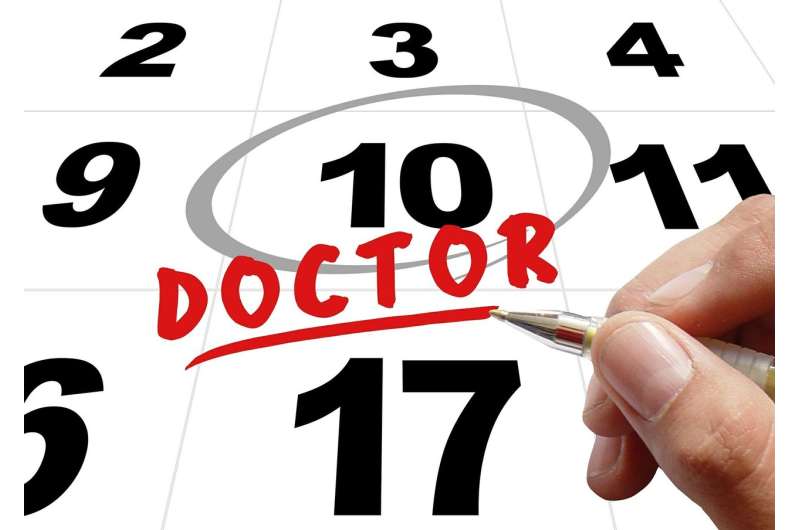Pandemic disruptions mean many older adults still havent gotten needed health care

They had the appointments on their calendars, for weeks or months, to see their doctor or dentist, or to have an operation, procedure or medical test. But the pandemic disrupted those plans for around 30% of older adults with a scheduled appointment for each of these kinds of health care, according to a new poll of people age 50 and older.
And many of them—especially those who aren’t vaccinated against COVID-19—still haven’t gotten the preventive care or treatment that they had been scheduled to get last year.
The new findings from the National Poll on Healthy Aging show the lingering effects of pandemic-related disruptions to regular care, which could have lasting implications for older adults’ health.
Whether the patient asked to postpone or cancel an appointment due to their own COVID-19 concerns, or their doctor’s office or hospital did so, pandemic-related care disruptions in 2021 affected a sizable number of older adults.
With the most recent surge in cases now declining fast, the poll shows the importance of encouraging people to get back on track with the care that the pandemic disrupted, said Jeffrey Kullgren, M.D., M.P.H., M.S., associate director of the poll and a health care researcher and associate professor of internal medicine at Michigan Medicine, the University of Michigan’s academic medical center.
“Whether they chose to postpone or their provider did, these patients missed opportunities for preventive care and for early detection and effective management of chronic conditions, not to mention operations and procedures to address a pressing health need,” said Kullgren, who also provides primary care to Veterans at the VA Ann Arbor Healthcare system. “The fact that half or more unvaccinated people have not yet rescheduled those disrupted appointments is especially concerning, because every encounter with a health care provider is also an opportunity to talk about the benefits and safety of COVID vaccination for older adults.”
The percentages of older adults who had a scheduled appointment disrupted due to COVID were about the same between age groups, genders, racial/ethnic groups, education levels, incomes, employment or marital status or region of the country.
The poll is based at the U-M Institute for Healthcare Policy and Innovation and supported by AARP and Michigan Medicine.
Key findings:
Procedures, tests & operations:
- Of all poll respondents, 14% said they had postponed, rescheduled or canceled a procedure, operation or test in the past year, and another 8% said their provider had done so.
- Among the older adults who had had an appointment scheduled to have a procedure, test or operation in 2021, 28% said they had a disruption to that plan related to COVID.
- Of those who had a test, procedure or operation delayed due to COVID in 2021, most had already received the delayed care by the time of the survey last month (34%) or had scheduled it for a future date (38%). Another 16% are planning to reschedule but haven’t done it yet, and 10% aren’t planning to reschedule.
- The difference in rescheduling between adults of different vaccination status was stark: 44% of unvaccinated older adults whose test, procedure or operation was disrupted have rescheduled it, compared with 81% of vaccinated and boosted older adults.
Primary care appointments:
- 15% of all older adults said they had postponed, rescheduled or canceled a visit to their primary care provider for a COVID-related reason in the past year, and 11% said their provider had postponed, rescheduled or canceled their appointment.
- Among the older adults who had had a primary care appointment scheduled in 2021, 29% said they had a disruption to that plan related to COVID.
- Primary care visits that got disrupted are getting back on track for most older adults, who either had a makeup visit already (56%) or have one on their calendar (20%). But 14% haven’t gotten around to rescheduling, and 8% aren’t planning to.
- There were major differences in rescheduling among older adults of different vaccination status: 53% of unvaccinated people, have rescheduled a primary care appointment that was disrupted by the pandemic in 2021, compared with 85% of boosted adults and 74% of vaccinated adults.
Dental appointments:
- 18% of all older adults said they had postponed, rescheduled or canceled a dental appointment in the past year for a COVID-related reason, and 8% said their provider had postponed, rescheduled or canceled their appointment.
- Among the older adults who had had a dental appointment scheduled in 2021, 31% said they had a disruption to that plan related to COVID.
- People who had received a booster dose of vaccine in addition to the primary 1 or 2 doses were more likely (36%) than non-boosted (21%) and unvaccinated (23%) adults to report that a dental appointment they had planned to have in 2021 was disrupted for a COVID-related reason.
- 47% of those with a pandemic-disrupted dental appointment have already had a rescheduled appointment, and 12% have an appointment coming up. But 26% haven’t rescheduled, and 11% have no plans to reschedule.
- The difference in rescheduling between adults of different vaccination status was also seen in dental care. Only 30% of unvaccinated people said they had rescheduled their disrupted dental appointment, compared with 64% of vaccinated and boosted people.
Like the national population of all people 50 and older, a large majority (83%) of the 1,011 poll respondents said they had been vaccinated. Booster doses were reported by 70% of people aged 50-64 who had been vaccinated, and 83% of vaccinated people over 65. But 23% of people aged 50 to 64, and 11% of people over 65, said they are not vaccinated. Unvaccinated people were more likely to be white, to have incomes under $30,000, or to have a high school education or less.
The new poll did not ask about the specific reason a patient canceled or postponed care, but National Poll on Healthy Aging data collected in the pre-vaccine era of the pandemic gives some insights.
An NPHA poll taken in January 2021 showed that nearly 1 in 3 older adults had canceled or postponed care in 2020 due to their personal concern about coronavirus exposure in health care environments.
Another NPHA poll taken in June 2020 showed 86% of older adults were concerned about coronavirus exposure if they went to an emergency department.
Poll director Preeti Malani, M.D., said that the cancelations by providers or hospitals seen in the new data may also reflect the impact of COVID-19 surges in 2021 on health care. High community transmission may have affected the ability of clinics and hospitals to maintain a usual schedule due to staff absences, and hospitals may have made changes to preserve bed capacity for severely ill COVID patients.
She said that older adults who have been especially careful about COVID-19 exposure should remember that seeking care—even if it means removing a mask temporarily to get dental work done—carries benefits, and that being vaccinated and boosted provides strong protection. And, since so many people had care delayed over the past two years, it’s important to make contact early to schedule any type of care, because there may be a longer wait than usual before the next available appointment.
Source: Read Full Article



